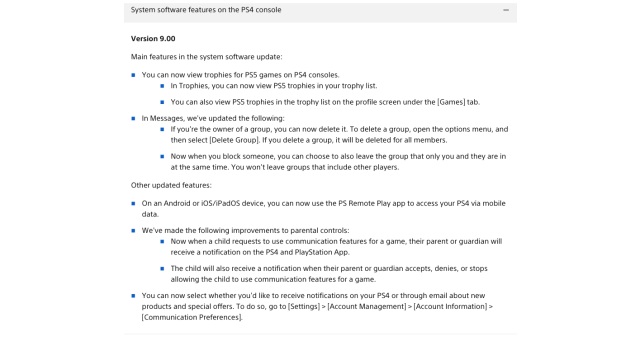PlayStation owners looking to preserve their PS4 libraries well into the future can breathe a sigh of relief, as the system’s latest firmware update reportedly fixes a time bomb found inside every console.
Recently confirmed via tests by Modern Vintage Gamer, an unforeseen perk of the PS4’s system software update version 9.00 appears to have nullified an authentication communication between the system’s internal clock and the PlayStation Network. This had been a security measure that, when failed on both sides, prevented any PS4 software, digital or physical, from playing at all. For anyone concerned about being able to play PS4 games (like, say, Hideo Kojima’s terrifying P.T., a delisted proof-of-concept demo for the cancelled Silent Hills) long after PSN support for the system has been shuttered, this is great news.
Connection problems
The problem is the PS4’s CMOS battery, which fits into the hardware’s motherboard and is used to internally track the date and time, even when there’s no power. If that battery is removed for replacement or just dies, the system can’t properly track the real-world calendar. This forces the PS4 to reconnect to PSN to establish the correct time—a routine check that happens every time you try to play a digital or physical game. So what happened, preupdate, if you had a dead-battery PS4 that isn’t connected to the Internet? That time check with PSN couldn’t be completed, meaning any games wouldn’t play.
In his video, MVG founder Dimitris Giannakis ran tests to verify rumblings on Twitter that the CMOS problem had indeed been fixed. To do so, he attempted to start a digital copy of 2018’s God of War after removing the CMOS from a base PS4 that was running older firmware and was disconnected from the Internet, which failed. Next, he updated console to the 9.00 firmware and then disconnecting it from the Internet before testing that game and a disc copy of 2018’s Shadow of the Colossus with the CMOS battery still removed. Both games started and ran without issues, although Giannakis did note that his trophy data for God of War had been reset.

This isn’t the first time Ars has reported on this looming threat, which still affects PS3 hardware even after the PS4 update has fixed it for that console. In March, Sony announced initial plans to shut down its online storefronts for PS3, PSP, and Vita. Word soon spread on social media that dying CMOS batteries—which have an average lifespan of 10-to-20 years—would eventually brick all PS4s after Sony inevitably discontinues PSN service for the console. The company reversed course on closing its PS3 and Vita stores in April after significant backlash, with Sony Interactive Entertainment head Jim Ryan saying in a statement, “It’s clear that we made the wrong decision here.”
Other console makers each have their own methods of addressing legacy platform gaming. Xbox Series X has a similar-but-different drawback in that some offline, disc-based Xbox One titles require a one-time online check to finish installing on Microsoft’s latest hardware, something Microsoft has yet to address. On a related note,, the total roster of available backwards-compatible titles for Xbox One and the original Xbox is also missing a number of games. Nintendo meanwhile has a history of shutting down older storefronts and online services once their hardware is phased out of production.
While Sony’s official patch notes for the 9.00 update strangely make no mention of the CMOS fix, it may point to a change in its attitude about PlayStation’s legacy platforms. With PS5’s backwards compatibility limited (so far) to PS4 titles and in the absence of a major overhaul to its PS Now streaming library of games, taking the step to push an update that nixes the CMOS issue on PS3 as well would be a welcome shift.

Be the first to comment